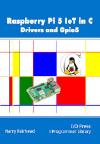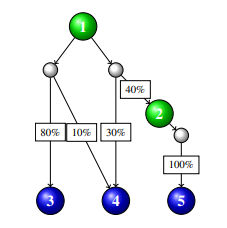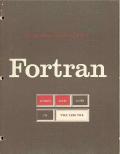|
In this week's top feature we revisit GPIO 5, the open source IoT library built by Harry Fairhead to provide direct access to the Raspberry Pi 5's hardware. And in the week in which Fortran first ran a program in 1974, the second feature is on Computational Grammer, starting with Bachus-Naur-Form, a fundamental theory for the translation of arithmetic expressions to machine code.
To receive this digest automatically by email, sign up for our weekly newsletter.

September 18 - 24, 2025
Featured Articles
|
Raspberry Pi 5 IoT In C - SPI with GPIO 5
21 Sep | Harry Fairhead

The Pi 5 has SPI but for direct access to its hardware you need to use GPIO 5. This is an extract from the Raspberry Pi 5 IoT In C: Drivers and Gpio5.
<ASIN:B0F4NMXRJN>
|
Programmer's Guide To Theory - Practical Grammar
19 Sep | Mike James

Computational grammar is a subject that is sometimes viewed as a form of torture by computer science students, but understanding something about it really does help ....
<ASIN:B081YS81L7>
|
|
Programming News and Views
|
Python Supreme In Era Of AI
24 Sep | Janet Swift

This finding comes from the latest IEEE Spectrum ranking of programming languages. But the rise of generative AI raises a lot of doubts for the future - including the need for a meaningful metric.
|
Gemini Gets Gold At World Programming Contest
24 Sep | Mike James

It isn't the first time that an AI has claimed sucess in a coding competition, but this one is impressive and highlights what the coming AI revolution my be all about.
|
Rust 1.90 Speeds Compile Times
23 Sep | Kay Ewbank

Rust 1.90 has been released. The new version uses LLD as the default linker, meaning linking and incremental builds are much faster. It also has native support for workspace publishing in Cargo, and the x86_64-apple-darwin target has been demoted to tier 2.
|
Open Source Is Not Just About Software
23 Sep | Nikos Vaggalis

It's about infrastructure as well, something that although not attracting the limelight, is as important as the open source software it hosts. Today the stewards of the largest open source registries in the world have issued an open letter demanding urgent reform in how open source infrastructure is funded, maintained, and operated.
|
Find Your Next MCP Server With GitHub's MCP Registry
22 Sep | Nikos Vaggalis

GitHub has just announced the GitHub MCP Registry, a new home base for discovering and building with MCP servers.
|
WASM 3 Released With 64-bit Address Space Support
22 Sep | Kay Ewbank

Web Assembly (WASM) 3 has been released with a number of improvements, including support for 64-bit address space; the ability to use multiple memory objects from a single module; and a garbage collector.
|
FORTRAN Milestone On This Day
21 Sep | Mike James

The very first successful FORTRAN program ran on September 20, 1954. Invented at IBM by a group led by John Backus, FORTRAN, standing for "FORmula TRANslator" was to first language to crack the problem of converting mathematical expressions to code.
|
Unicode 17 Updates Core Specification
19 Sep | Kay Ewbank

Unicode 17 has been released, with new characters and code charts, updated data files, an updated Core Specification, and updated annexes and synchronized standards that cover implementation details for important aspects of text processing.
|
Apache Moves To Oak Leaf Logo
19 Sep | Kay Ewbank

Apache has unveiled its new logo to replace the long-standing feather logo. The organization will also be moving to using the name "ASF" rather than "Apache Software Foundation".
|
Microsoft Urged To Continue Support For Windows 10
18 Sep | Sue Gee

Windows 10 is due to reach its end of support on October 14th, 2025, despite the fact that it still has a substantial share of the Windows Desktop market. Consumer Reports has sent a letter to Satya Nadella arguing that Microsoft should extend this deadline in order not to "strand millions of consumers who have computers that are incompatible with Windows 11".
|
MongoDB Extends Search And Vector Search
18 Sep | Kay Ewbank

The MongoDB team has made a number of announcements regarding new features and products at the recent New York staging of its MongoDB.Local conference series.
|
|
Book Watch
|
Magical Haskell (Apress)
In this book. subtitled "A Friendly Approach to Modern Functional Programming, Type Theory, and Artificial Intelligence", Anton Antich uses playful metaphors and examples to help teach Haskell through imagination, building on math without relying on imperative crutches or technical complexity. Readers will use math to build completely different Typed Functional patterns from the ground up and understand the link between building mathematics through yypes and constructing Haskell as a programming language.
<ASIN:B0DQGF9SL7 >
|
Data Without Labels (Manning)
This book introduces mathematical techniques, key algorithms, and Python implementations for building machine learning models for unannotated data. It bridges the gap between complex math and practical Python implementations, covering end-to-end model development all the way through to production deployment. Vaibhav Verdhan introduces hands-off and unsupervised machine learning approaches that can still untangle raw, real-world datasets and support sound strategic business decisions.
<ASIN: 1617298727>
|

I Programmer has reported news for over 12 years. You can access I Programmer Weekly back to January 2012 for all the headlines plus the book reviews and articles.
To keep up with the latest news and receive this digest automatically by email, sign up for our weekly newsletter and follow us on Twitter, Facebook, and LinkedIn , where you are welcome to share all our stories.
You can also subscribe to our RSS Feeds - we have one for Full Contents , another for News and also one for Books with details of reviews and additions to Book Watch.
Send your programming press releases, news items or comments to : NewsDesk@i-programmer.info |















